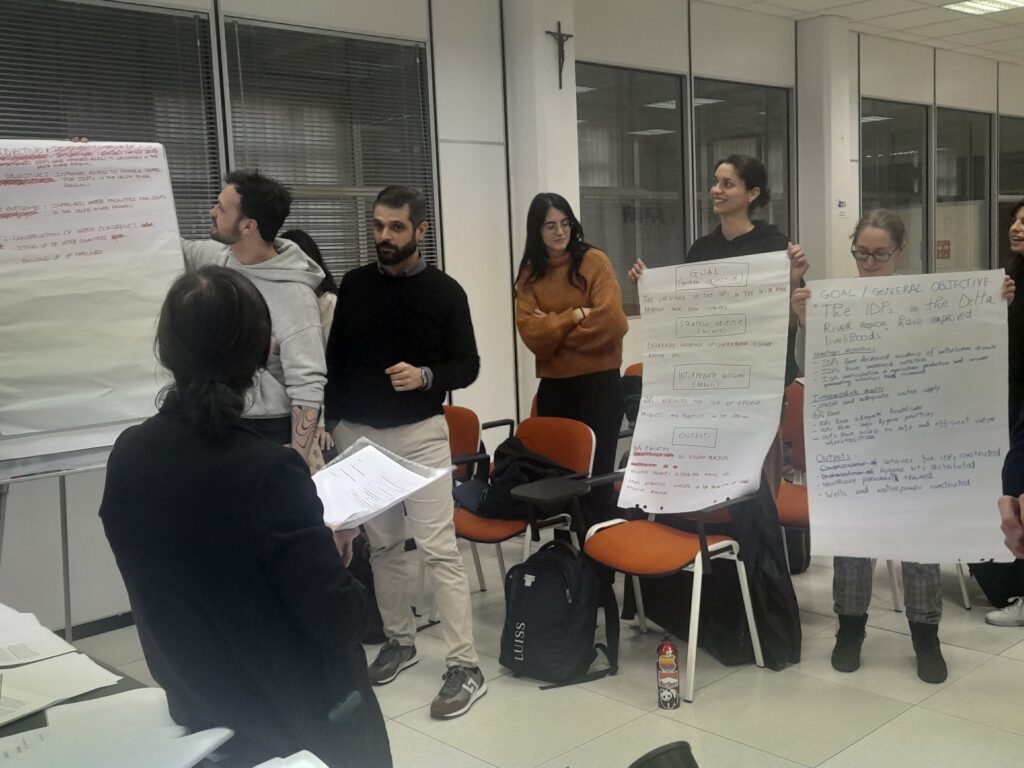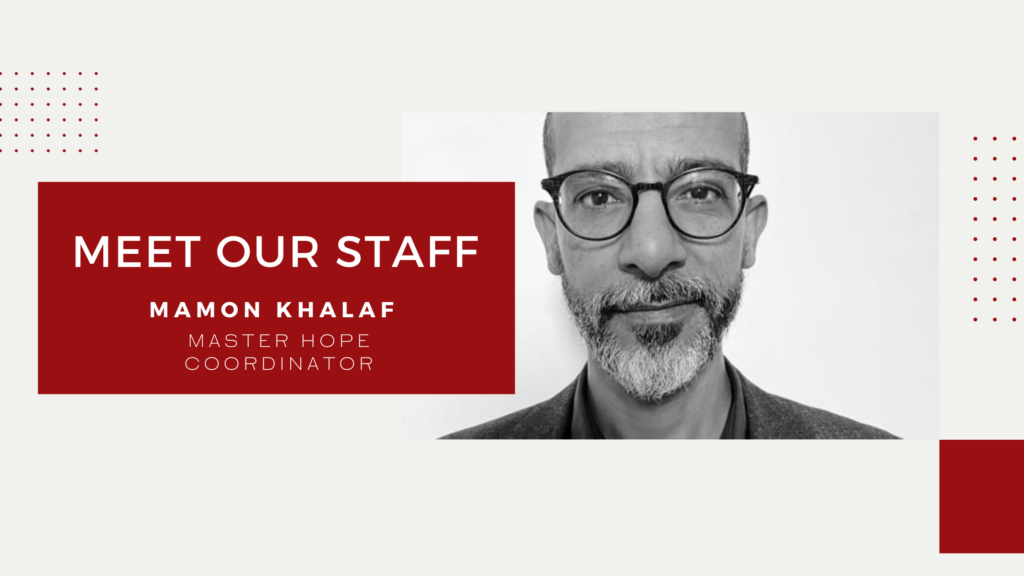A valuable school is made up of valuable people and we are keen to introduce you to all of them, starting with our staff.
Today we give the floor to Mamon Khalaf, our HOPE (Humanitarian Operations in Emergencies) Master Coordinator, who will tell us a little more about himself and also give some advice to those who want to pursue a career in international cooperation.
Could you share a defining experience in your work within humanitarian and emergency sector that shaped your perspective on the field?As a Jordanian citizen, experiencing the influx of both Iraqi and Syrian refugees has been a defining aspect of my engagement with the humanitarian and emergency sector.as I am Jordanian of a Palestinian refugee-origin family deepened my empathy for the Iraqi and Syrian refugees and all refugees and displaced people in general.
The Iraqi influx, which began in the early 2000s following the US-led invasion of Iraq, presented significant challenges for Jordan. Suddenly, the country had to accommodate a large number of displaced individuals fleeing violence and instability in their home country. This influx strained resources and infrastructure, placing pressure on local communities and services.
Witnessing the plight of Iraqi refugees firsthand, I became acutely aware of the urgent need for humanitarian assistance and support. I volunteered with local organizations to provide aid to displaced families, distributing food, clothing, and medical supplies to those in need. Through this experience, I gained a deeper understanding of the complexities of forced displacement and the importance of solidarity and compassion in addressing humanitarian crises.
The Syrian influx, which began in 2011 with the outbreak of the civil war in Syria, further compounded the challenges faced by Jordan. The number of refugees seeking safety and shelter in our country continued to rise, placing additional strain on resources and infrastructure already stretched thin by previous waves of displacement.
Engaging in humanitarian support during the Syrian influx, even remotely, reinforced the lessons learned from the Iraqi experience. I saw how the humanitarian response evolved to meet the changing needs of displaced populations, with a greater emphasis on long-term support and resilience-building initiatives led by grass root movements beside those of local and international NGOs.
Overall, the experiences of witnessing both the Iraqi and Syrian influxes have shaped my perspective on the humanitarian and emergency sector. They have taught me the importance of empathy, solidarity, and collective action in responding to crises, as well as the need for sustainable solutions that address the root causes of displacement and conflict. These experiences have inspired me to continue advocating for the rights and dignity of refugees and to work towards building a more inclusive and compassionate society.
What do you see as the most important qualities or skills for a student to succeed and have an impact in this sector?
Many skills would be important, but I would choose communicating as a pivot and key skill for any success. Communicating in a clear, effective, and efficient way is an extremely critical and useful skill. Learning from great communicators and actively practicing ways to improve communications over time can certainly support students’ efforts to achieve various personal and professional goals. Strong communication skills, including writing, public speaking, and interpersonal communication, are crucial for advocating for social change, building relationships with stakeholders, and mobilizing support for initiatives.
Apart from my personal point of view, Succeeding and making an impact in the social change sector requires a combination of qualities and skills that are both practical and adaptable to the dynamic nature of social challenges. Among the most important qualities and skills for students in humanitarian sector could be:
- Passion and Commitment. A genuine passion for social change and a strong commitment to making a positive difference are foundational qualities. This drive will sustain students through challenges and setbacks as they work towards their goals.
- Critical Thinking and Problem-Solving. The ability to critically analyze complex social issues, identify root causes, and develop innovative solutions is essential. Students should be adept at thinking creatively and strategically to address systemic challenges effectively.
- Collaboration and Teamwork. The ability to collaborate effectively with diverse stakeholders, including community members, NGOs, government agencies, businesses, and other organizations, is vital for driving collective action and achieving sustainable impact.
- Adaptability and Resilience. The social change sector is dynamic and often unpredictable, requiring students to be adaptable, resilient, and open to learning from failures and setbacks. Flexibility and the ability to pivot strategies in response to changing circumstances are essential for success.
- Ethical Leadership. Ethical leadership rooted in integrity, empathy, and a commitment to social justice is fundamental in the social change sector. Students should demonstrate a strong sense of ethical responsibility in their decision-making and actions, prioritizing the well-being of marginalized communities and vulnerable populations.

What kind of support the Social Change School students can expect from the Lecturers and you?
At Social Change School, students can expect various forms of support from lecturers and myself as a coordinator.
- Academic Support. Social Change School lecturers provide academic support by offering guidance on course materials, assignments, and projects. This may include clarification of concepts, additional resources, and feedback on student work to help them succeed academically. Beside that, lecturers serve as mentors and advisors, offering personalized guidance to students on their academic and professional goals. This could involve helping students identify their strengths and interests, exploring career paths, and providing advice on networking and professional development opportunities.
- Access to Resources. Our lecturers help students access resources relevant to their studies and interests, such as research databases, academic journals, and sector publications. We can also facilitate connections with external organizations, experts, and alumni networks to support students’ learning and career aspirations.
- Personal Support. In addition to academic guidance, our lecturers and myself provide personal support to students, such as advice on time management, stress management, and work-life balance. We can offer a listening ear and practical strategies to help students navigate challenges and overcome obstacles they may encounter during their studies.
- Community Engagement. The coordinator of the master facilitate opportunities for students to engage with their peers, faculty, and the wider community. This could involve organizing guest lectures, workshops, networking events, and collaborative projects that foster a sense of community and collaboration among students.
Beyond the curriculum, are there ‘extracurricular’ opportunities available to students? In your experience, how do these enrich the overall learning process?
Yes, extracurricular activities are essential part of the social change school philosophy as they play a crucial role in enriching the overall learning process for students. These activities provide opportunities for students to explore their interests, develop new skills, build relationships, and gain valuable experiences outside of the traditional classroom setting. The school offers vary extracurricular opportunities that offer several benefits for the students of HOPE Master on different aspects like:
- Skill Development, through activities allow students to develop a wide range of skills, including teamwork, leadership, communication, time management, and problem-solving. For example, our students involved in project work learn about teamwork, discipline, and resilience, while in a presenting their case studies they hone their public speaking and critical thinking skills.
- Personal Growth, through participating in different Career Development Service activities encourages their personal growth and self-discovery. Our students thanks to the Career Development Service department have the chance to explore new interests, discover hidden talents, and challenge themselves in ways that may not be possible within the confines of the classroom.
- Social Interaction, working on their career plan and personal branding provide our students opportunities to interact with peers, but also high profiles in the humanitarian sector who share similar interests, fostering friendships, networking and a sense of belonging. These social connections can be especially valuable for our students who may struggle to find their place in the professional environment.



